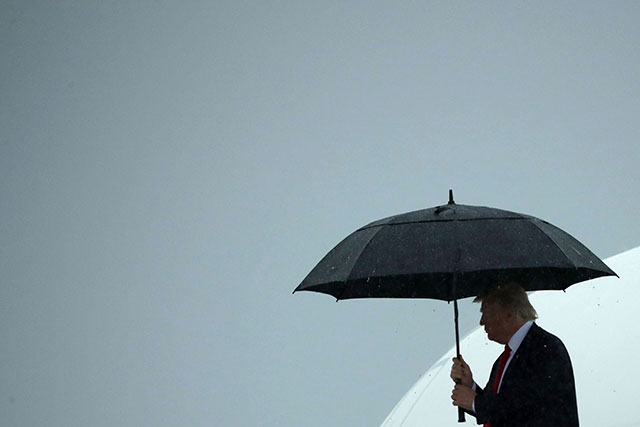
Support justice-driven, accurate and transparent news — make a quick donation to Truthout today!
President Donald Trump declared war on Congress this past weekend: Both parties and both chambers, and including modestly paid Capitol Hill staffers. Not only that, he threatened to unilaterally rescind subsidies to help low-income Americans pay their health insurance premiums, potentially stripping millions of Americans of their coverage. In a Saturday tweetgasm, the Trump blurted from his porcelain throne:
If a new HealthCare Bill is not approved quickly, BAILOUTS for Insurance Companies and BAILOUTS for Members of Congress will end very soon!
— Donald J. Trump (@realDonaldTrump) July 29, 2017
The “bailout for Insurance Companies” is Trump’s obnoxious shorthand for what Reuters described as “$8 billion in cost-sharing reduction subsidies paid by the federal government to insurers to lower the price of health coverage for low-income individuals.” In other words, if you and your family earn less than 400 percent of the Federal Poverty Level (FPL), the government helps you pay your premiums. Given that health insurance coverage is now mandated by the government and given that uninsured Americans tend to drive up health care costs, premium subsidies are both fair and fiscally responsible.
The “bailout for Congress” is more complicated, but the fact that Trump threatened to kill it with fire ought to both infuriate and ostracize members from both sides of the aisle (more about this presently). Trump is engaging in clear extortion in order to further pursue his maniacal obsession with repealing the ACA, despite Senate Majority Leader Mitch McConnell’s declaration that it’s “time to move on.”
Let’s review. Several years ago, former House Speaker John Boehner and former Senate Majority Leader Harry Reid led a bipartisan group of congressional lawmakers to the White House in order to convince President Obama to continue providing a salary benefit for members of Congress and their staffers. Obama acquiesced to their request for the Office of Personnel Management (OPM) to continue its decades-long practice of providing health insurance premium-sharing as a benefit for any members who choose to have employer-based insurance coverage.
Until 2013, members were covered under the same government employee health plan as all other federal workers: the Federal Employees Health Benefits (FEHB) program. Briefly put, it’s the public-sector equivalent to the employer-based health coverage most Americans receive through their private sector full-time jobs. As of 2013, though, a seldom-discussed amendment to the Affordable Care Act (ACA), proposed by Republican Sen. Chuck Grassley, went into effect, requiring that all members of Congress and staffers who wanted to continue their employer-based health coverage purchase their plans through the District of Columbia’s marketplace, established through the ACA. However, the Grassley amendment didn’t include any provisions for continuing FEHB’s premium-sharing, under which the government pays 72 percent of the health premiums for members and staff. Again, that isn’t out of the norm, given that most full-time workers in America receive a similar benefit through their jobs.
This brings us back to Boehner, Reid, Obama and the OPM. Per the request of Congress, Obama ordered OPM to write a new rule allowing members and staff to continue receiving the premium-sharing salary benefit, ported to the DC exchange. Without the rule, Hill employees and their bosses would face a massive pay cut. Obama’s rule solved that problem, but no good deed goes unpunished: Republicans almost immediately began framing the benefit as an “exemption from Obamacare,” making it appear as if Congress was exempt from the entire law.
A terrifying moment. We appeal for your support.
In the last weeks, we have witnessed an authoritarian assault on communities in Minnesota and across the nation.
The need for truthful, grassroots reporting is urgent at this cataclysmic historical moment. Yet, Trump-aligned billionaires and other allies have taken over many legacy media outlets — the culmination of a decades-long campaign to place control of the narrative into the hands of the political right.
We refuse to let Trump’s blatant propaganda machine go unchecked. Untethered to corporate ownership or advertisers, Truthout remains fearless in our reporting and our determination to use journalism as a tool for justice.
But we need your help just to fund our basic expenses. Over 80 percent of Truthout’s funding comes from small individual donations from our community of readers, and over a third of our total budget is supported by recurring monthly donors.
Truthout has launched a fundraiser to add 379 new monthly donors in the next 6 days. Whether you can make a small monthly donation or a larger one-time gift, Truthout only works with your support.